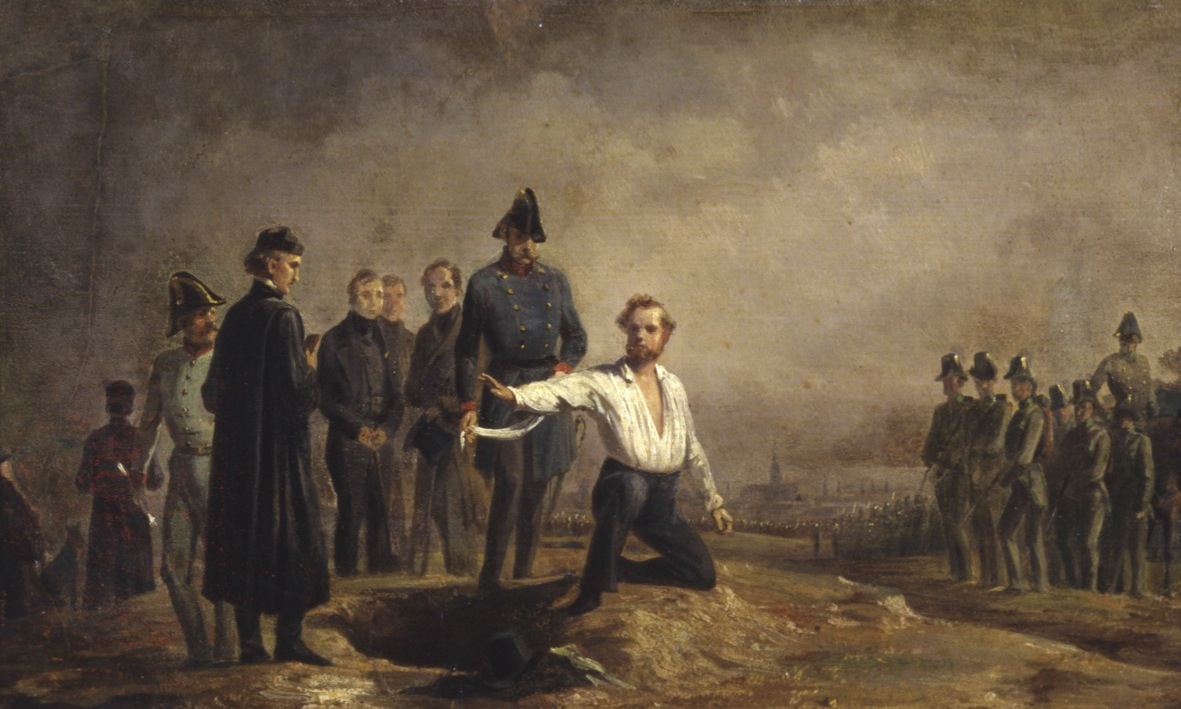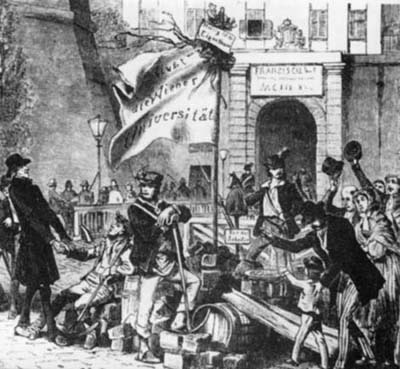|
Vienna Uprising
The Vienna Uprising or October Revolution (german: Wiener Oktoberaufstand, or ) of October 1848 was the last uprising in the Austrian Revolution of 1848. On 6 October 1848, as the troops of the Austrian Empire were preparing to leave Vienna to suppress the Hungarian Revolution, a crowd sympathetic to the Hungarian cause (of workers, students and mutinous soldiers) tried to prevent them from leaving. The incident escalated into violent street battles; blood was spilt in Saint Stephen's Cathedral and Count Baillet von Latour, the Austrian Minister of War, was lynched by the crowd. The commander of the Vienna garrison, Count Auersperg, was obliged to evacuate the city, but he entrenched himself in a strong position outside it. On 7 October, Emperor Ferdinand I fled with his court to (now Olomouc, Czech Republic) under the protection of Alfred I, Prince of Windisch-Grätz. Two weeks later, the Austrian Parliament was moved to (now Kroměříž, Czech Republic). On 26 October, ... [...More Info...] [...Related Items...] OR: [Wikipedia] [Google] [Baidu] |
Josip Jelačić
Count Josip Jelačić von Bužim (16 October 180120 May 1859; also spelled ''Jellachich'', ''Jellačić'' or ''Jellasics''; hr, Josip grof Jelačić Bužimski; hu, Jelasics József) was a Croatian lieutenant field marshal in the Imperial-Royal Army and politician, the Ban of Croatia between 23 March 1848 and 19 April 1859 of Croatian descent. He was a member of the House of Jelačić and a noted army general, remembered for his military campaigns during the Revolutions of 1848 and for his abolition of serfdom in Croatia. Early life and military The son of Croatian baron Franjo Jelačić Bužimski (or in other documents, ) (1746–1810), a lieutenant Field Marshal, and Austrian mother Anna Portner von Höflein, The honorific ''Bužimski'' refers to Bužim, a location in Lika, that was used by the Jelačić family. Jelačić was born in the town of Petrovaradin which was a part of the Slavonian Military Frontier of the Habsburg monarchy and today it is part of Vojvodina ... [...More Info...] [...Related Items...] OR: [Wikipedia] [Google] [Baidu] |
Academic Legion (Vienna)
The Academic Legion (german: Akademische Legion) was a military organization formed by university students in Vienna during the Revolutions of 1848. It played a key role in toppling the government of Clemens Metternich and precipitating his retirement on 13 March 1848. The Legion dissolved in October 1848 when the Vienna Uprising was crushed. History The Legion, formed in 1849, was composed of about 6,000 university students. Although students were well represented in the revolutionary vanguard of most cities affected by the revolution during this time, nowhere had the university students played so important and prominent a part in the revolutionary movement as in Vienna. The students exercised a preponderant influence in the “central committee,” the administrative body of the revolutionaries, which consisted of an equal number of students and members of the citizens' militia. Deputations of citizens and peasants came from all parts of Austria to present their grievances and ... [...More Info...] [...Related Items...] OR: [Wikipedia] [Google] [Baidu] |
Neo-absolutism
The Austrian Empire (german: link=no, Kaiserthum Oesterreich, modern spelling , ) was a Central Europe, Central-Eastern Europe, Eastern European multinational state, multinational great power from 1804 to 1867, created by proclamation out of the Habsburg monarchy, realms of the Habsburgs. During its existence, it was the third most populous monarchy in Europe after the Russian Empire and the United Kingdom of Great Britain and Ireland, United Kingdom. Along with Kingdom of Prussia, Prussia, it was one of the two major powers of the German Confederation. Geographically, it was the third-largest empire in Europe after the Russian Empire and the First French Empire (). The empire was proclaimed by Francis II, Holy Roman Emperor, Francis II in 1804 in response to Napoleon's declaration of the First French Empire, unifying all Habsburg monarchy, Habsburg possessions under one central government. It remained part of the Holy Roman Empire until the latter's dissolution in 1806. It co ... [...More Info...] [...Related Items...] OR: [Wikipedia] [Google] [Baidu] |
Revolutions Of 1848 In The Habsburg Areas
The Revolutions of 1848 in the Austrian Empire were a set of revolutions that took place in the Austrian Empire from March 1848 to November 1849. Much of the revolutionary activity had a nationalist character: the Empire, ruled from Vienna, included ethnic Germans, Hungarians, Slovenes, Poles, Czechs, Slovaks, Ruthenians (Ukrainians), Romanians, Croats, Venetians and Serbs; all of whom attempted in the course of the revolution to either achieve autonomy, independence, or even hegemony over other nationalities. The nationalist picture was further complicated by the simultaneous events in the German states, which moved toward greater German national unity. Besides these nationalists, liberal and even socialist currents resisted the Empire's longstanding conservatism. Preamble The events of 1848 were the product of mounting social and political tensions after the Congress of Vienna of 1815. During the "pre-March" period, the already conservative Austrian Empire moved further aw ... [...More Info...] [...Related Items...] OR: [Wikipedia] [Google] [Baidu] |
Parliamentary Immunity
Parliamentary immunity, also known as legislative immunity, is a system in which politicians such as president, vice president, governor, lieutenant governor, member of parliament, member of legislative assembly, member of legislative council, senator, member of congress, corporator and councilor are granted full immunity from legal prosecution, both civil prosecution and criminal prosecution, in the course of the execution of their official duties. As such, the immunity must be removed before prosecution may commence, usually by a parliamentary body. This eliminates the possibility of pressing a politician to change their vote by fear of prosecution. Westminster system countries Legislators in countries using the Westminster system, such as the United Kingdom, are protected from civil action and criminal law for slander and libel by parliamentary immunity whilst they are in the House. This protection is part of the privileges afforded the Houses of Parliament under the Co ... [...More Info...] [...Related Items...] OR: [Wikipedia] [Google] [Baidu] |
Robert Blum
Robert Blum (10 November 1807 – 9 November 1848) was a German democratic politician, publicist, poet, publisher, revolutionist and member of the National Assembly of 1848. In his fight for a strong, unified Germany he opposed ethnocentrism and it was his strong belief that no one people should rule over another. As such he was an opponent of the Prussian occupation of Poland and was in contact with the revolutionists there. Blum was a critic of antisemitism, supported the German Catholic sect, and agitated for the equality of the sexes. Although claiming immunity as a member of the National Assembly, he was arrested during a stay at the hotel "Stadt London" in Vienna and executed for his role in the Revolutions of 1848 in the German states. Biography Blum grew up in poverty in Cologne, the son of a failed theologian who made a poor living as a cooper. He was ten years old before he could go to school. After his schooling, he worked as a craftsman in different trades. He ... [...More Info...] [...Related Items...] OR: [Wikipedia] [Google] [Baidu] |
Hermann Jellinek
Hermann Jellinek (22 January 1822 in Drslavice – 23 November 1848 in Vienna) was a writer, journalist, and revolutionary from a prominent Austrian Jewish family. His older brother Adolf Jellinek was one of Austria-Hungary's leading rabbis and writers. Life He left home at 13 to study at university and gained a doctorate in philosophy from Leipzig University, where he was later expelled. During his education, he abandoned plans to become a rabbi, and became an atheist and liberal radical. Afterward, he moved to Berlin, but was expelled there too for his political activities, and arrived in Vienna in March 1848. In Vienna, Jellinek supported the liberal and anti-Hapsburg revolutionary movements as a journalist. Following the violent repression of the October 1848 Vienna Uprising The Vienna Uprising or October Revolution (german: Wiener Oktoberaufstand, or ) of October 1848 was the last uprising in the Austrian Revolution of 1848. On 6 October 1848, as the troops of the Austrian ... [...More Info...] [...Related Items...] OR: [Wikipedia] [Google] [Baidu] |
Alfred Julius Becher
Alfred may refer to: Arts and entertainment *''Alfred J. Kwak'', Dutch-German-Japanese anime television series * ''Alfred'' (Arne opera), a 1740 masque by Thomas Arne * ''Alfred'' (Dvořák), an 1870 opera by Antonín Dvořák *"Alfred (Interlude)" and "Alfred (Outro)", songs by Eminem from the 2020 album ''Music to Be Murdered By'' Business and organisations * Alfred, a radio station in Shaftesbury, England *Alfred Music, an American music publisher *Alfred University, New York, U.S. *The Alfred Hospital, a hospital in Melbourne, Australia People * Alfred (name) includes a list of people and fictional characters called Alfred * Alfred the Great (848/49 – 899), or Alfred I, a king of the West Saxons and of the Anglo-Saxons Places Antarctica * Mount Alfred (Antarctica) Australia * Alfredtown, New South Wales * County of Alfred, South Australia Canada * Alfred and Plantagenet, Ontario * Alfred Island, Nunavut * Mount Alfred, British Columbia United States * Alfred, Maine, a ... [...More Info...] [...Related Items...] OR: [Wikipedia] [Google] [Baidu] |
Wenzel Messenhauser
Wenzel is a male given name (long version Wenzeslaus) as the German and Old English form of the Czech given name Václav or Venceslav, meaning "praised with glory". Variations are Вячеслав (Ukrainian and Russian), Vencel (Hungarian), Wacław, Więcław, Wiesław (Polish), Venceslas/Wenceslas (French), Venceslao (Italian), Venceslau (Portuguese), Wenceslao (Spanish). Given name * Wenzel Jamnitzer (ca. 1507–1585), Austrian-German etcher and goldsmith * Wenzel, Archduke of Austria (1561–1578), Austrian prince and Grand Prior of the Order of Malta * Wenzel Anton Graf Kaunitz (1711–1794), Austrian statesman * Wenzel Raimund Birck (1718–1763), Austrian composer * Wenzel Parler (1333–1399), German-Bohemian architect * Wenzel Pichl (1741–1805), Czech composer * Wenzel Thomas Matiegka (1773–1830), Bohemian composer * Prince Klemens Wenzel von Metternich (1773–1859), German-Austrian politician and statesman * Wolfgang Wenzel von Haffner (1806–1892), Norwegian Mi ... [...More Info...] [...Related Items...] OR: [Wikipedia] [Google] [Baidu] |
Józef Bem
Józef Zachariasz Bem ( hu, Bem József, tr, Murat Pasha; March 14, 1794 – December 10, 1850) was a Polish engineer and general, an Ottoman pasha and a national hero of Poland and Hungary, and a figure intertwined with other European patriotic movements. Like Tadeusz Kościuszko (who fought in the American War of Independence) and Jan Henryk Dąbrowski (who fought alongside Napoleon Bonaparte in Italy and in the French Invasion of Russia), Bem fought outside Poland's borders anywhere his leadership and military skills were needed. Early life He was born on 14 March 1794 in Tarnów in Galicia, the area of Poland that had become part of the Habsburg monarchy through the First Partition in 1772. After the creation of the Duchy of Warsaw from the territories captured by Napoleon, he moved with his parents to Kraków, where after finishing military school (where he distinguished himself in mathematics) and joined the ducal forces as a fifteen-year-old cadet. He joined a P ... [...More Info...] [...Related Items...] OR: [Wikipedia] [Google] [Baidu] |



.jpg)
